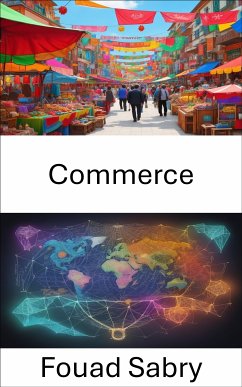What is Commerce
Commerce is the large-scale organized system of activities, functions, procedures and institutions that directly or indirectly contribute to the smooth, unhindered distribution and transfer of goods and services on a substantial scale and at the right time, place, quantity, quality and price through various channels from the original producers to the final consumers within local, regional, national or international economies. The diversity in the distribution of natural resources, differences of human needs and wants, and division of labour along with comparative advantage are the principal factors that give rise to commercial exchanges.
How you will benefit
(I) Insights, and validations about the following topics:
Chapter 1: Commerce
Chapter 2: Capitalism
Chapter 3: E-commerce
Chapter 4: Tertiary sector of the economy
Chapter 5: Merchant
Chapter 6: Market economy
Chapter 7: Wholesaling
Chapter 8: Commodity fetishism
Chapter 9: Economic system
Chapter 10: Drop shipping
Chapter 11: History of capitalism
Chapter 12: International business
Chapter 13: Market (economics)
Chapter 14: Online marketplace
Chapter 15: Import
Chapter 16: Economic law
Chapter 17: History of trade of the People's Republic of China
Chapter 18: Black market
Chapter 19: Competition
Chapter 20: Economic democracy
Chapter 21: Employment
(II) Answering the public top questions about commerce.
(III) Real world examples for the usage of commerce in many fields.
Who this book is for
Professionals, undergraduate and graduate students, enthusiasts, hobbyists, and those who want to go beyond basic knowledge or information for any kind of Commerce.
Commerce is the large-scale organized system of activities, functions, procedures and institutions that directly or indirectly contribute to the smooth, unhindered distribution and transfer of goods and services on a substantial scale and at the right time, place, quantity, quality and price through various channels from the original producers to the final consumers within local, regional, national or international economies. The diversity in the distribution of natural resources, differences of human needs and wants, and division of labour along with comparative advantage are the principal factors that give rise to commercial exchanges.
How you will benefit
(I) Insights, and validations about the following topics:
Chapter 1: Commerce
Chapter 2: Capitalism
Chapter 3: E-commerce
Chapter 4: Tertiary sector of the economy
Chapter 5: Merchant
Chapter 6: Market economy
Chapter 7: Wholesaling
Chapter 8: Commodity fetishism
Chapter 9: Economic system
Chapter 10: Drop shipping
Chapter 11: History of capitalism
Chapter 12: International business
Chapter 13: Market (economics)
Chapter 14: Online marketplace
Chapter 15: Import
Chapter 16: Economic law
Chapter 17: History of trade of the People's Republic of China
Chapter 18: Black market
Chapter 19: Competition
Chapter 20: Economic democracy
Chapter 21: Employment
(II) Answering the public top questions about commerce.
(III) Real world examples for the usage of commerce in many fields.
Who this book is for
Professionals, undergraduate and graduate students, enthusiasts, hobbyists, and those who want to go beyond basic knowledge or information for any kind of Commerce.
Dieser Download kann aus rechtlichen Gründen nur mit Rechnungsadresse in A, B, BG, CY, CZ, D, DK, EW, E, FIN, F, GR, H, IRL, I, LT, L, LR, M, NL, PL, P, R, S, SLO, SK ausgeliefert werden.









